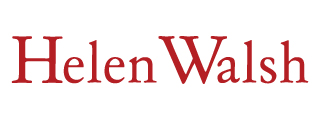I’m writing this from the Newport, Rhode Island where I am having a 4-day long weekend. It’s The Ocean Race weekend, the only North American stop on an around the world sailing race (32,000 nautical mile or 60,000 km), that is amongst the world’s toughest and craziest team sports.
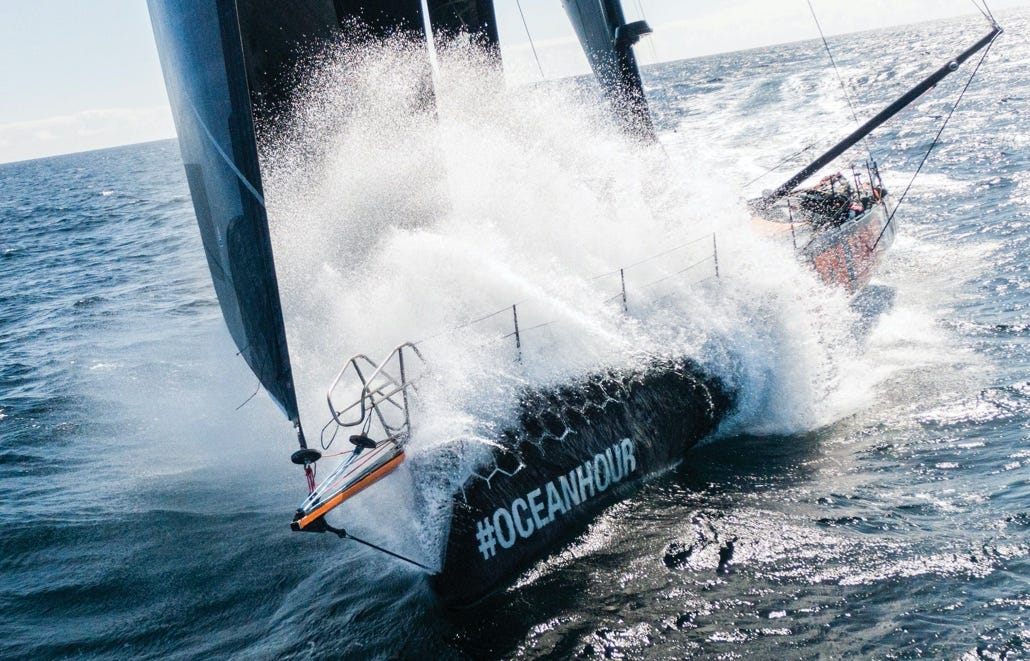
The crew race day and night for more than twenty days at a time on some legs, slammed by the wind and waves and extreme conditions that can fluctuate from -5 to +40 degrees Celsius, hands raw from effort, skin burnt to a crisp. They subsist on freeze-dried food, sleeping when they can in cramped quarters, wearing the same smelly clothes for months on end.
The sailboats have onboard laboratories measuring samples of the ocean’s health and transmitting it almost simultaneously to scientists around the world.
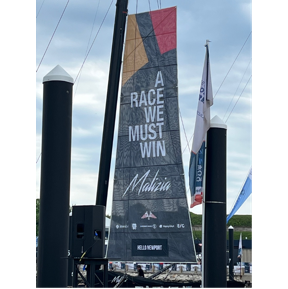
11th Hour Racing, the hometown team, thrilled the Newport community on May 10thby winning the fourth leg which had departed from Itajaí, Brazil.
The Ocean Race takes remarkable endurance (+ skill + decades of training + sponsorships) and a determination to keep heading into the prevailing head winds, no matter how fierce.
“There is no question these are boat-breaking conditions. . .we are under some pressure to get out of the path of this low that is only going to intensify. And the only way to get out of its path is to run… headfirst into a growing and confused sea state, typical of the northeast-flowing Gulf Stream. We’re slamming straight into breaking waves at 26 knots. You are never more alert than in times like these. It’s violent seated, violent standing, violent on your knees!”
11th Hour Racing Team Member
We all face various endurance tests in our life – some physical, some emotional, those we choose and those life throws at us. Whether we ride the wave or sink below it is a complicated dance of resiliency, privilege, externalities and grit.
For writers, the headwinds are frequent. Internal doubts, external criticism, an industry that relies on your output but often treats writers paternalistically or with disregard.
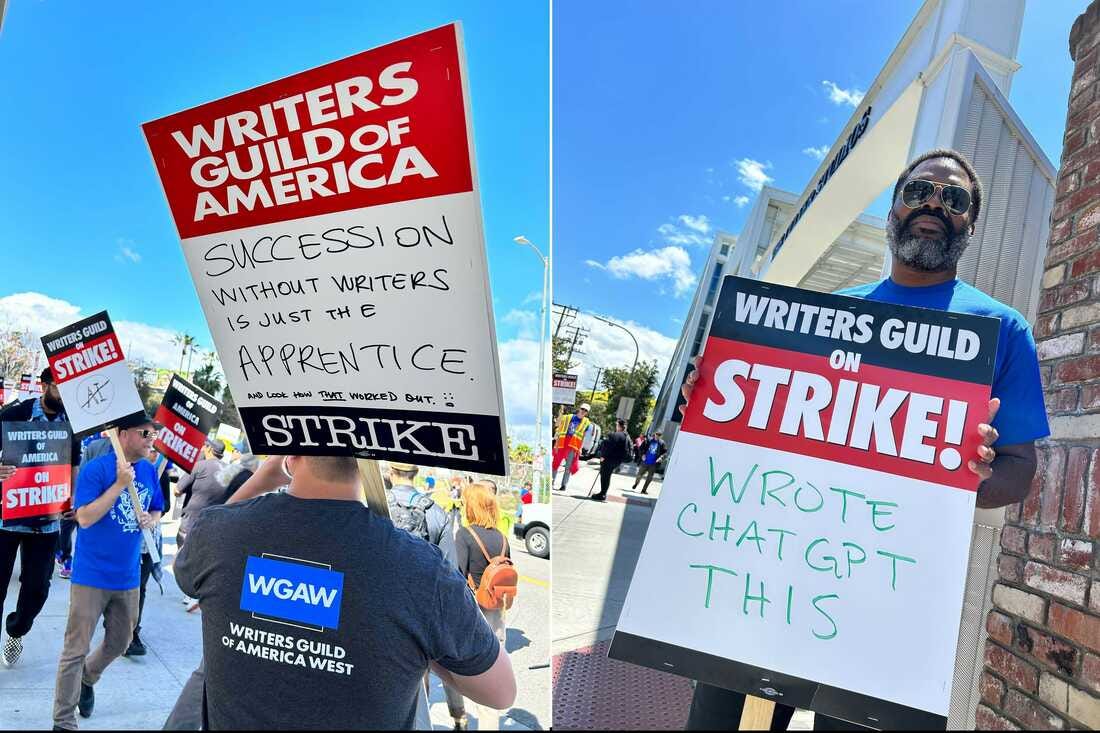
A desire for greater transparency and control (creative, financial and/or logistical), along with industry attitudes such as these, are leading more and more writers to choose indie/self-publishing. Not because they can’t get traditionally published (aka through a publishing house), but because they don’t to.
When I was publisher of a book review magazine, we refused to consider self-published books for review. Everyone around the editorial table was in agreement. It was hard enough to sort through thousands of books a year; we thought the editorial process undertaken by publishing houses asserted a kind of quality control. Most review outlets still follow the same rule of thumb.
Now, I’m not so sure. Concepts of excellence really are subjective. Tech and generational change are driving innovations in publishing. Experienced writers are choosing indie publishing, thus changing the overall creative output. Barriers to legitimacy (reviews, bookstore distribution, inclusion in festivals) are falling.
And if social media is now more important to a book’s success than traditional reviews, and digital-first readers don’t differentiate between indie and traditionally published authors, then the lines are blurry.
A truism often repeated at the London Book Fair was that It’s easier than ever to get published but more difficult than ever to break into traditional industry.
Indie authors were interwoven as speakers throughout the LBF seminar program. They argued that ultimately the choice for writers boils down to issues of control:
👉Of copyright/intellectual property. With complete control over IP, you can market your backlist as aggressively as you like, across multiple territories. There is a 20 book to $50k phenomena in indie publishing, which calculates how many books/sales you need to generate a $50k per annum cashflow in perpetuity.
Also, many of these authors sub-license various rights, particularly for translations. The most successful are also distributed through bookstores. They argue it never makes the best economic sense for any author to license all rights to one publisher.
👉Of the timelines (want to publish your book quicker than 18-24 months?).
👉Of the transparency of information (imagine being able to see your sales daily, rather than once or twice a year when you get royalty statements).
👉Of the cashflow (no waiting for royalty cheques).
👉Of the creative. The successful indie writers all hire substantive editors, copyeditors, proof-readers and book designers. But they have control over all facets including cover design, a particularly sensitive topic. (See below.)
👉Of audience. The most successful indie authors aggressively build their own email lists using ‘reader magnets’ (free ancillary writing such as extra chapters, short stories, etc) and newsletters. Then they sell their books direct to this readership.
But indie road is not for everyone. You must be willing to see your writing as a career and take responsibility for it.
(That seems obvious but there’s a taboo in publishing against openly discussing money as if it somehow devalues the creative impulse. The lack of transparency about financials certainly isn’t to the benefit of most writers. . .)
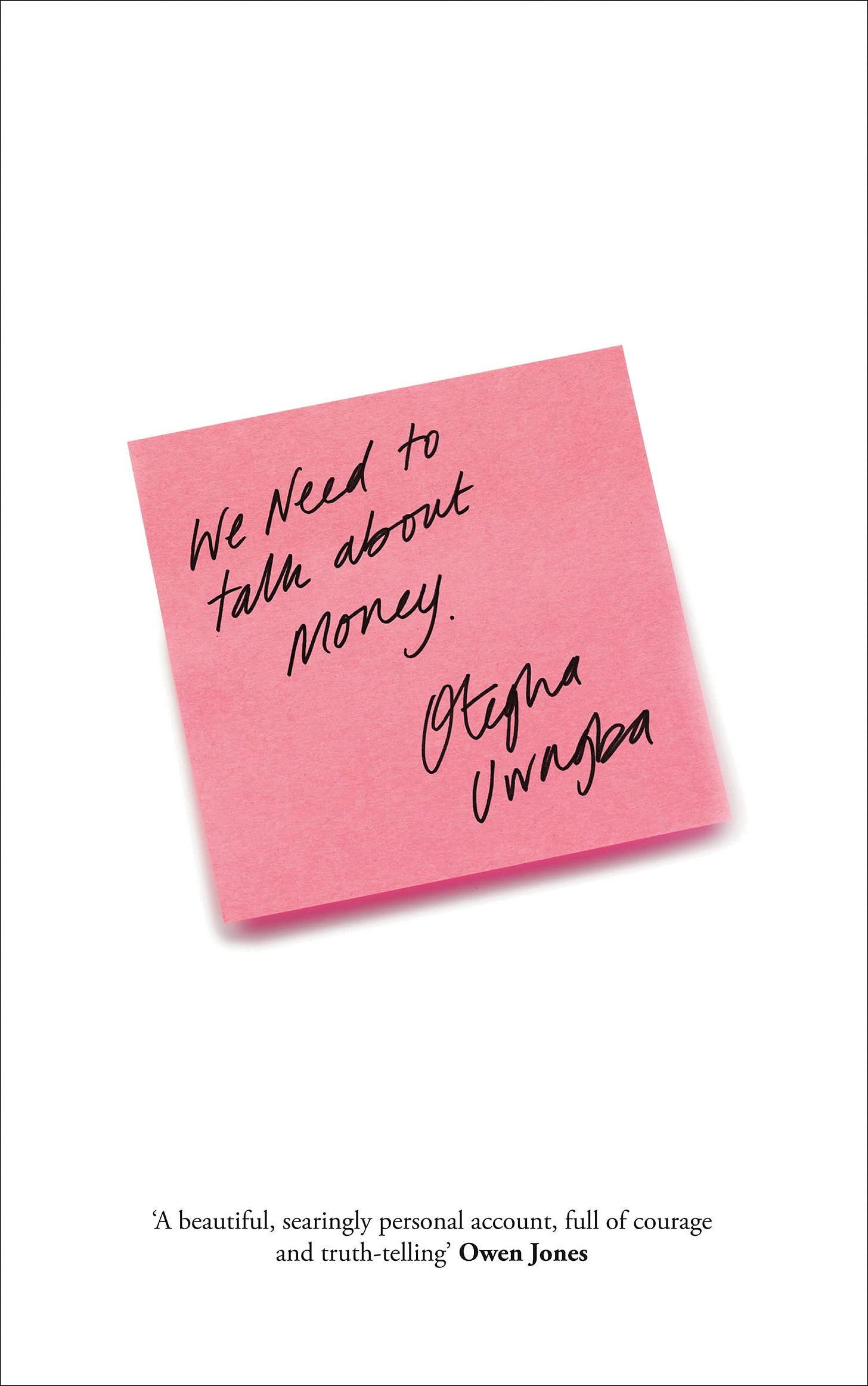
Indie authors argue that since the size of the social media platform a writer builds is a major determining factor in getting signed by a traditional publisher (confirmed by agents), and since an author will be expected to hire their own publicity help anyhow, why shouldn’t they keep the financial upside for themselves?
But one does need to be willing to invest money to get started, as the experienced indie authors all recommend outsourcing services. They note that innovations in tech have decreased the costs of production, marketing and distribution including translation services; the biggest single cost is quality editorial.
And although indie publishing advocates describe three models for indie authors – prolific/productive, craft or engagement – clearly those who do well economically are prolific, publishing more than one book a year. (They argue this is true, too, for traditional publishing but it’s just less visible.)
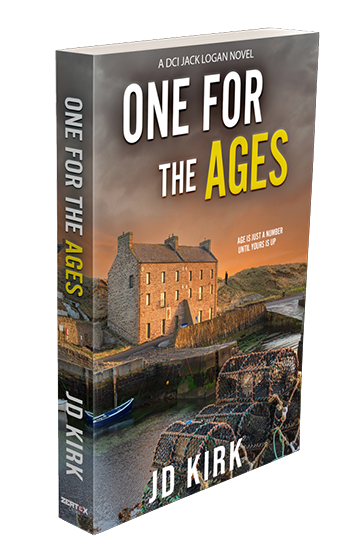
Case study #1: J.D. Kirk, Scottish crime writer whose real name is Barry Hutchinson.
Barry has sold 2 million copies of his books since he began self-publishing in 2019. Previously, he was a HarperCollins author. He built a substantial email list of readers through the use of reader magnets. He contracts a distributor to ship the books directly to them (e-book, audio book and/or print); with the physical books he does a print run of 5,000 at a time. He’s also carried through online retailers and in bricks and mortar bookstores and sells more than way as an indie author than he ever did when he was with HarperCollins.
Barry’s advice: Look at readers as your clients. Let them into your life by sharing personal news in your newsletter and on social (even if you need to fictionalize it). Spend money on quality editing, design, marketing and distribution – an indie author’s time is best spent on writing. Creating templates makes things easier.
So how much do Indie authors really make?
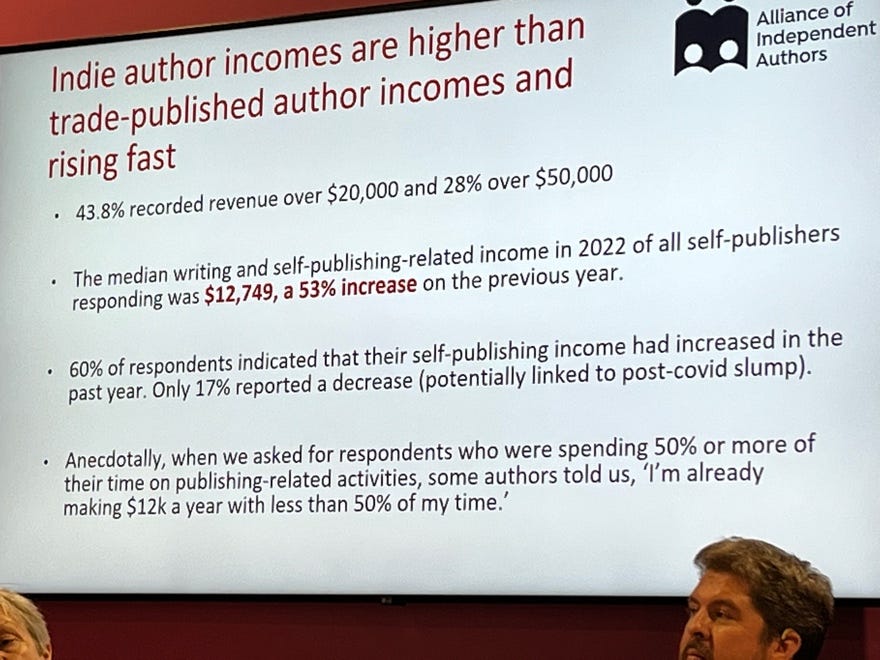
The first ever comprehensive survey of indie author income was released during the London Book Fair, showing that indie authors made more money than traditionally published authors.
Indie authors had never included in surveys of author income, nor did traditional survey questions fit the range of activity indie authors do. So the Alliance of Independent Authors (ALLi) undertook one, focused on writers who devote at least 50% of their time to writing. Among the results:
👉 The average income was high: $82,607. The median, ie after they controlled for the outliers at the very top and bottom, was $12,749 and growing year over year, compared to C$9,380 in Canada*, down 27% since 2015, for traditionally published authors. (*Source: The Writers Union of Canada.)
👉 Most of the income came from book sales although there is also ancillary income.
👉 Certain genres do better than others, in particular romance, SFF, crime/thriller/detective – the same for traditional publishing.
👉 75% of book sales are from series. It’s very hard to market an individual title as you can’t leverage the marketing costs.
👉 Overall, authors who are willing to be entrepreneurial are well-positioned to do well.
The Alliance noted there a huge indie community and they hold many of their own conferences; they know anecdotally that many indie authors who are serious about writing make five and six figures.
One big caveat: this survey is gross income. ALLi explained this was because they were setting a benchmark with this initial survey. They intend to undertake it annually and will release both gross and net incomes. They also point out that many traditionally published authors incur their own marketing, publicity and travel/event-related costs beyond what the publisher is able to provide.

Case study #2: Preethi Nair, Kiss the Frog Productions.
Preethi wrote her first novel and could not get a publishing deal. So, she created her own publishing company to publish it. She also created her own PR agency under an assumed name and was nominated for publicist of the year!
The novel was a big success; HarperCollins came calling. Pretthi signed a three-book deal with them. The first did incredibly well, but then the team at HC changed. With the next book, they chose a cover she despised.
As she describes it, she’s a queer, brown woman who writes literary fiction starring brown women. But the cover image the new team chose looked like ‘chick-lit’ and featured a white woman. Preethi knew her readers would not pick it up, but the HarperCollins team would not listen to her. Finally, they changed the woman’s skin from white to yellow and refused any further changes.
The book tanked as did her subsequent one. HC offered Preethi another contract, but she’s turned it down. She’s going back to indie publishing, outsourcing all editorial, design, marketing and distribution. Her advice: if you care about control, self-publish. Invest in publicity, sales and marketing teams. Hire top quality editorial.
ALLi argues that the rest of the world as a market is growing, and traditional publishers don’t do well with foreign rights. People want to see cultures other than their own. Case in point: Amish romance is a bestseller, far beyond the numbers of Amish in the world.
We’re also seeing the dramatic rise of audiobook popularity. These panellists spoke of the need for all authors to produce them. For traditionally published authors, they advise contractually obligating a publisher to produce audiobook version if assigning those rights and/or inserting a clause that reverts those rights if not done within a certain time period.
Is indie publishing right for you? After listening to the passion and professionalism of these authors and thinking about all the writers I know or have worked with, I would say it really depends on the individual person and their entrepreneurial spirit.
Are you willing to hustle, claim publishing as your career, write constantly and take responsibility for it by committing all-in? That’s not a small question.
Indie publishing rejects much of the romanticism about a #writinglife that doesn’t pan out in reality for most authors but is seductive and pervasive anyway. You have to hustle, produce and market even if you are traditionally published, but the final responsibility doesn’t stop with you.
As I wrote a couple newsletters ago, I think it boils down to your individual definition of success, and your desire for control.
Thanks for joining me for the final instalment from my London Book Fair trip! Next month back to the regular Letterbox format.
Please connect with me @HelenWalshBooks on Twitter, Instagram, Goodreads, Facebook, Linked-In, TikTok, and through my website: www.helenwalsh.ca

